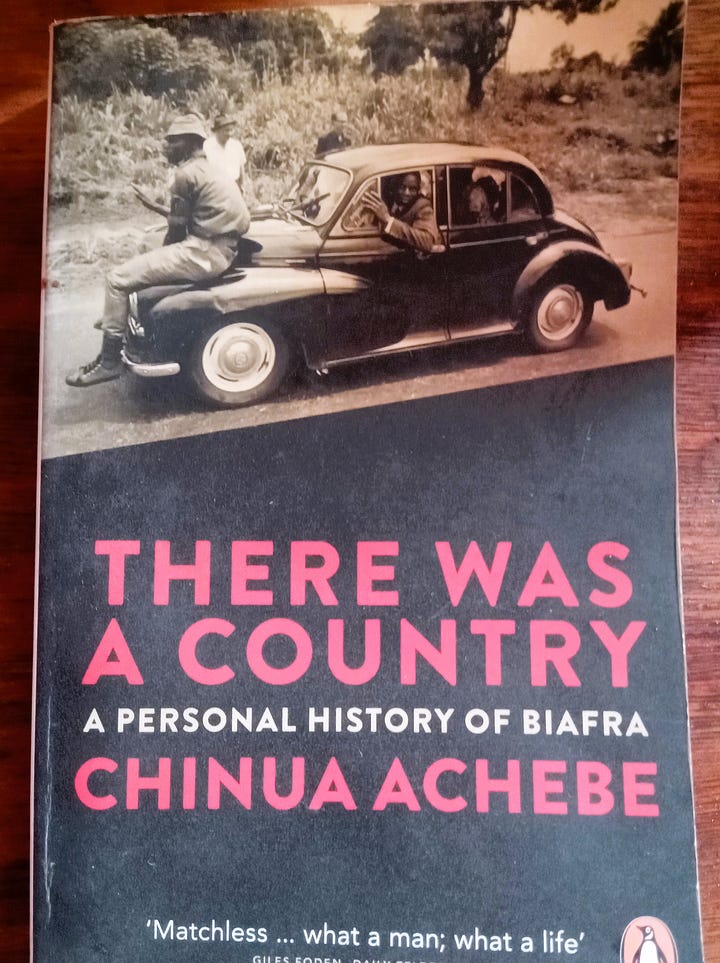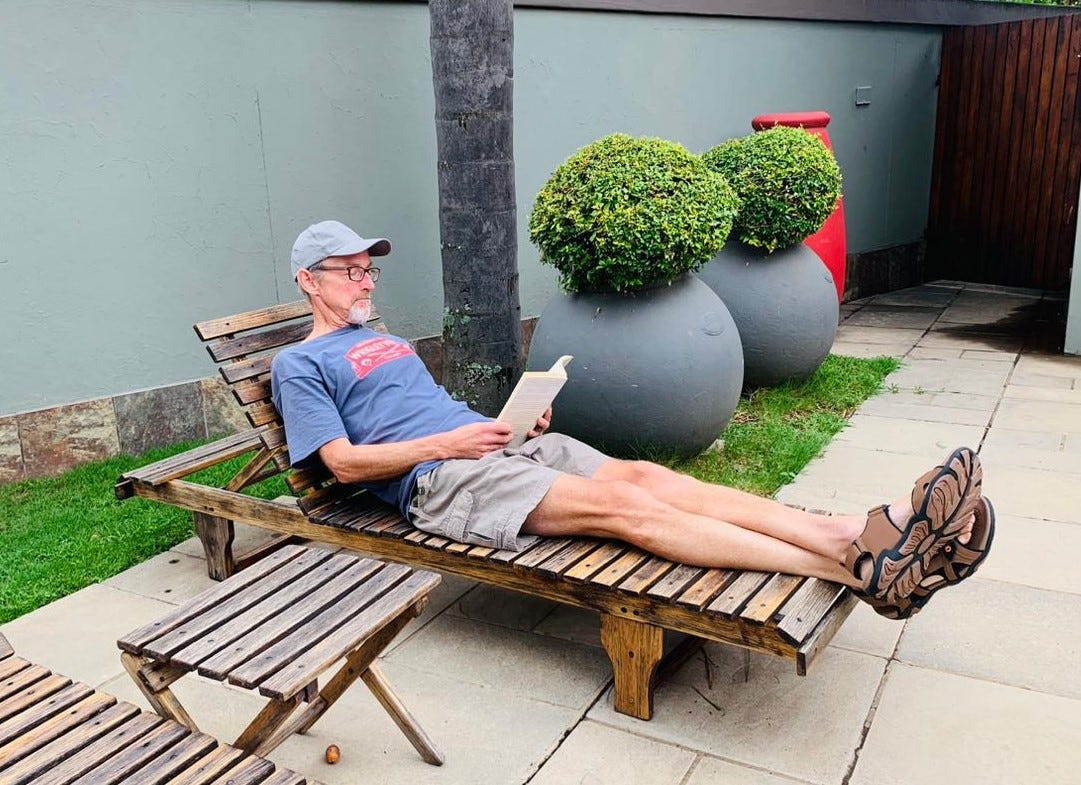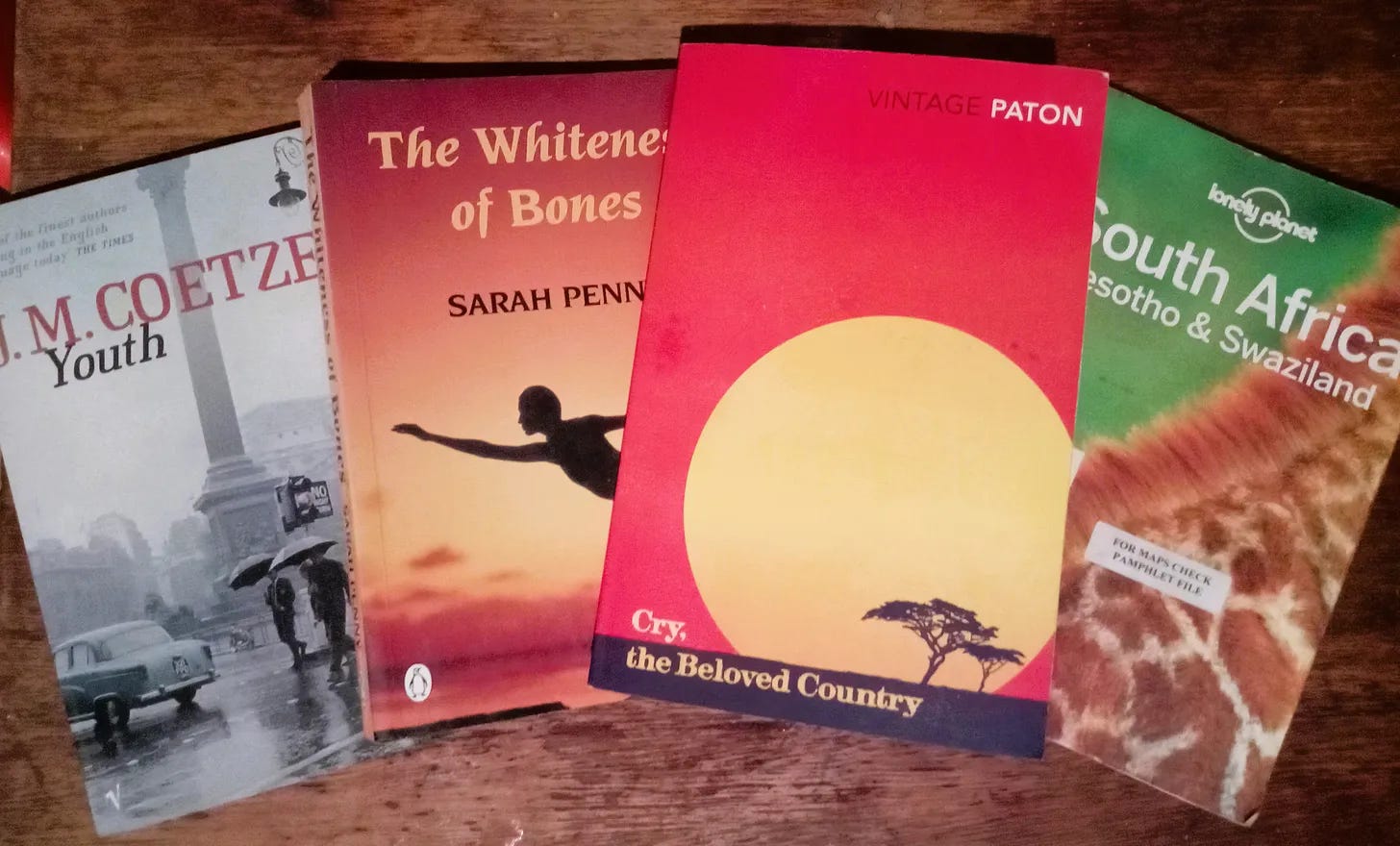Whiling away the hours…
In the face of all of the changes in Peace Corps service over the last three-plus decades, it’s clear that one pastime that has weathered the storm of the information age — and all of its attendant changes in human habits and behaviors — is the simple act of reading. Even with the myriad new ways to fill those spare hours, the humble book is still the choice of many a volunteer regardless of their age or location. Whether you’re clutching a worn-out paperback or a spiffy new e-reader, perusing the works of writers old and new — far and wide — is still a great way to let your mind go and pass an hour or two during a power outage or a blazing Saturday afternoon (as I’m trying to do now). In this last year my book consumption went up notably over past years; whether this is due to an actual increase in spare time or, as I suspect, a different approach to using it, is not entirely clear.
More than a year ago I stepped off the plane with an armload of paperbacks and — thanks to the generosity of a certain relative — an e-reader (still in its box). And they all just sat there nearly untouched for my first three months in country. It seems that the rigors of being in sessions all day, coupled with trying to be a good guest (to my host family) and keeping up with language practice, meant little time for leisure activities, much less settling in with a book. Finally, upon arriving on the quieter, calmer scene in the village, and with school out of session, there was more opportunity to indulge in other, more esoteric, activities — exploring, bird-watching, doodling, experimenting with blogging and yes: reading. While others appeared to struggle with this newfound glut of unstructured days, I relished it. Sure, there was the looming imperative to improve language, immerse in community life, and assess local needs, but there was also time…time to explore and indulge one’s interests, and I did just that that — including getting back to the books.


Looking back…
Not surprisingly, when I served 35 years ago, our reading choices were limited: basically, for Peace Corps volunteers in non-anglophone countries, the primary source of printed material was the collection of paperbacks that circulated among them; they were dingy, tattered and in high demand as tradable commodities. I distinctly remember lively discussions over such contemporary classics (at least in our minds) as ‘The Village of Waiting,’ ‘The Africans,’ ‘Beyond the Seventh Game’ and ‘A Handmaid’s Tale.’ Books such as these — in addition to a Sony Walkman with a dozen dusty cassette tapes and a usually dated copy of Newsweek (which were issued to all Peace Corps volunteers at the time) — were our go-tos for passing the long, sometimes empty. hours of the day. Although these book collections still exist in Peace Corps circles around the world — in this era of instantaneously available digital material — they are now relegated to a minor though still significant role in providing intellectual stimulation and enrichment. Add to these. and all of the digital sources, the availability of brick-and-mortar purveyors of new and used books in this anglophone country and thirty five years later the possibilities for reading seem just about endless.
So then, just what am I reading?
For me it’s been a mix: finish up those books that I dragged over here, some of which had logged years of inattention on my shelves; take part in the time-honored P.C. book exchange; try my luck at the occasional second-hand store; and, of course, boot-up that e-reader. An eclectic mix perhaps, this assortment is certainly not meant to head up a book club or stand in for anyone’s best-seller list or college course syllabus. Rather, they are books that I came across in a variety of ways, which I have enjoyed reading. Their median copyright date — perhaps predating the Harding Administration — may speak as much to the pricing schemes used by e-book retailers as to my affinity for bygone authors. For the most part they dwell in themes that, in one way or another, seem relevant to my current circumstances. I’ll aim to update this list here when I can.
Africa
‘The Life and Times of Michael K.’ - J.M. Coetzee
A bleak fictional account of dislocation and alienation in a South Africa beset by civil strife — by the home grown author who garnered just about every literary honor imaginable and moved on.
‘Journey without Maps’ - Graham Greene
Those who know me well would question the veracity of any list purporting to be mine without at least one work by G.G., so here it is. Fascinating life; renowned writer; terrible travel partner.
‘Towards the Mountain’ - Alan Paton
Biographical sketch of the ominous period leading up to the Apartheid crackdown in the mid-1900s. Essential history from a South African literary great and political operative.
‘The Good Doctor’ - Damon Galgut
A worthwhile tale about the complications and moral ambiguities involved in trying to make a difference in post Apartheid S.A.
‘Long Walk to Freedom’ - Nelson Mandela
A comprehensive auto-biography that moves like a thriller. Much of it written, encrypted and smuggled out of prison, this powerful oeuvre is essential reading for S.A. if not everywhere.
‘A Bend in the River’ - V.S Naipul
I don’t know how it took me so long to discover this guy. Third culture merchants, strong-men, tribalism, and rebel activities simmering up in the jungles of post colonial Africa — it’s all there.
‘There was a Country’ - Chinua Achebe
A first hand chronicle of the brutal civil war that devastated Africa’s largest country — one from which it is still recovering — by a giant of African literature, himself of Igbo blood.
‘Cry, the Beloved Country’ - Alan Paton
A classic novel on race relations in Apartheid era South Africa. Beautiful renderings of the people, the land and the song of the black lapwing — don’t forget your tissues. Essential reading for South Africa.
‘The Whiteness of Bones’ - Sarah Penny
An entertaining account of a young woman’s travels through Africa in the 1990s (just as the rest of the continent was opening its doors to S.A. passports) by this unsung South Africa writer. A serendipitous find at a used book store.


Beyond
‘The Invention of Nature’ - Andrea Wulf
This thorough biography of a visionary 19th-century scientist bridged two continents with me, and perhaps that is appropriate as von Humboldt’s life spans vast geographies during a formative period in world history. Ponderous at times, but certainly worthwhile for anyone interested in history or nature.
‘The English Patient’ - Michael Ondaatje
This gem could have gone on the list above. Sublime descriptions of Tuscany and the Sahara during the WWII period. Somehow a copy spent two decades on my bookcase before I finally cracked it 8000 miles away.
‘A Thousand Acres’ - Jane Smiley
Some of my pals here would balk at this entry, but this hard-scrabble tale of a family divided by inheritance in rural America seems all too topical anywhere, any time. Cuts a bit close to home as a co-inheritor of a farm.
‘The Moon and Sixpence’ - Somerset Maugham
This enjoyable story tracks a tortured artist who grows steadily more obsessed with his life’s work — from London to Paris to Tahiti — where it all goes down. Another ‘new’ author discovered here.
‘Kim’ - Rudyard Kipling
India at the height of British imperial reign with England and Russia vying for regional supremacy (the Great Game) — all from the perspective of a European orphan that befriends a Buddhist guru. Intriguing premise; fascinating period, interesting read.
‘Death Comes to the Archbishop’ - Willa Cather
This story — with its conspicuous parallels to 19th century South Africa — is so good it had me wishing to come back in another life as a missionary in New Spain. Another literary icon that it took me way too long to ferret out.
‘The Gruffalo’ - Julia Donaldson
For the young ones and teachers out there, this portrayal of the time honored theme of cunning conquering brawn is choice. There’s been at least one occasion when paging through this picture book has helped to buoy my spirits after a tough day in the classroom.
So whatever it may be — and whether it comes by way of printed pages, slate tablets, or the latest mobile device — enjoy your next reading adventure!







Thanks Drew! After all the physical walk-abouts and cultural engagements, this more introspective literary traipsing was unexpected and an enjoyable new piece of your experience there. You may inspire the direction of my next (non-work) reading adventure in a couple weeks. I'll be on a beach in FL poring through a book or two. Adding to your continental list, try Joyce Carey's "Mister Johnson." As I recall (20 years ago?), it's based in Nigeria, but I found it provacative and rich in human and cultural (and colonial) themes. Take care, sb
Drew, try the series The No. 1 Ladies' Detective Agency by Alexander McCall Smith